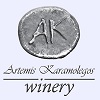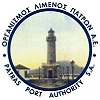Greek Movie Nights
You are all invited to participate in a celebration of Greek cinema – and a small country’s thriving film industry-- and to learn more about Greek contemporary society and life. Cinema speaks with images! Don’t let the language barrier –despite the subtitles-- inhibit a unique opportunity to see Greece through the eyes of its directors. You will be entertained, informed and surprised!
January 2014
| 14 Jan 2014 | El Greco (2007), Sala Auditorium, Club House at 20:45 |
| 21 Jan 2014 | Zorba the Greek (1964), Sala Auditorium, Club House at 20:30 |
| 30 Jan 2014 | Ulysses' Gaze (1995), Sala Auditorium, Club House at 20:00 |
February 2014
| 04 Feb 2014 | Rembetiko (2013), Sala Auditorium, Club House at 20:30 |
| 11 Feb 2014 | Love in the End (2013), Sala Auditorium, Club House at 20:30 |
| 18 Feb 2014 | A Touch of Spice (2003) movie and aperitivo |
| 25 Feb 2014 | Z (1969), Sala Auditorium, Club House at 20:30 |
March 2014
| 04 Mar 2014 | Miss Violence (2013), Sala Auditorium, Club House at 20:30 |
| 11 Mar 2014 | Cheap Smokes (2000) , Sala Auditorium, Club House at 20:30 |
| 18 Mar 2014 | Attenberg (2010) , Sala Auditorium, Club House at 20:30 |
| 25 Mar 2014 | Never on Sunday (1960) , Sala Auditorium, Club House at 20:45 |
April 2014
| 08 Apr 2014 | Plato’s Academy (2009), Sala Auditorium, Club House at 21:00 |
| 29 Apr 2014 | Psyhi vathia – Deep Soul (2009), Sala Auditorium, Club House at 20:45 |
May 2014
| 06 May 2014 | Dogtooth (2009), Sala Auditorium, Club House at 20:30 |
| 13 May 2014 | Captain Corelli's Mandolin (2001), Sala Auditorium, Club House at 20:45 |
| 20 May 2014 | The prism (2011), Sala Auditorium, Club House at 20:30 |
June 2014
| 03 Jun 2014 | Eternity and a Day (1998), Sala Auditorium, Club House at 20:30 |
| 10 Jun 2014 | The King (2002) , Sala Auditorium, Club House at 20:45 |
| 17 Jun 2014 | The Fortune Teller (1956) , Sala Auditorium, Club House at 20:45 |
About the Event
The event will offer a panoramic view of Greek cinema from the 1960’s to the present day. The purpose of the event is to entertain the participants while offering a bird’s eye view of the Greek society and life of the last 50 years. Our goal is to present as much as technical considerations will permit us the most critically acclaimed cinematographic works, films which were box-office successes, and films which received international acclaim.
A history of Greek Cinema
Cinema as popular entertainment is largely a post-war phenomenon in Greece, although a tradition of Greek filmmaking can be traced back to the early 20th century. The first Lumiere films were shown in central Athens in 1897. The first film made in Greece was a newsreel of the 1906 interim Olympic games. The first full-length feature film was Golfo (1914) by Costas Bachatoris.
The rise of Greek cinema in the post-war years is closely connected to the establishment of Finos Films Production Company. By the mid 1950s, numerous films were being produced. With few exceptions, commercial Greek cinema in this period consisted of low-budget comedies and melodramas. Nonetheless, the early 1950s saw some independent film productions. Grigoris Grigoriou (1919-), the director of Bitter Bread (1951), introduced Greek neo-realism, under the influence of the Italian post-war cinema of Roberto Rossellini, Luciano Visconti and Vittorio De Sica.
At the same time, two other independent film-makers launched their careers: Michael Cacoyannis (1922-), a Greek Cypriot, whose film Stella (1955), launched the career of actress Melina Mercouri (1923-94), and Nikos Koundouros (1926-) with his film The Ogre of Athens (1956). Despite such classics as A Girl in Black (1956), starring Elli Lambetti and his screen versions of the Euripidean tragedies Electra (1961), The Trojan Women (1971) and Iphigenia (1977), Cacoyannis is best known for Zorba the Greek (1964), an adaptation of the novel by Nikos Kazantzakis (1883-1957).
In the 1960s, film directors such as Alexis Damianos (1921-), Theo Angelopoulos (1935-) and Pantelis Voulgaris (1940-) attempted to break with the commercial film industry. They created the 'New Greek Cinema' - an auteur cinema outside the studio system, much like the French New Wave. The term New Greek Cinema refers to a broad category of films concerned with contemporary Greek social issues and the nation's recent history of political repression and conflict. While for the most part it eschewed the narrative techniques of mainstream Greek cinema, the New Greek Cinema found inspiration in the experimentation that characterized European art cinema.
Internationally, Greek film is synonymous with Palme D'Or winner Theo Angelopoulos’ lyrical, contemplative films. However, it is a cinematic style cut from quite a different cloth, which has really caused a stir in recent years, lifting Greek box office figures from the disappointing lows of the 1970s and '80s.
Interestingly, a series of more understated films triggered the return of audiences to Greek cinema in the early 1990s. Pericles Hoursoglou 's Lefteris Dimakopoulos, Goritsa 's From the Snow, and Antonis Kokkinos ' The End of An Era initiated a thaw in the frosty indifference of many Greeks towards a cinema they viewed as too introspective or high-brow.
Angelopoulos' films (Eternity and a Day and The Suspended Step of the Stork) earned 180,000 tickets in Greece in 1998-9 and 1991-2, respectively. Following in the path of Tonia Marketaki (The Price of Love) (1942-94), women directors are making their mark. Sotiris Goritsas' Balkanizater (1997), the story of two men's pursuit of fortune in the black-market economies of the Balkans, hit some 300,000 tickets, a considerable box office success for Greece.



















